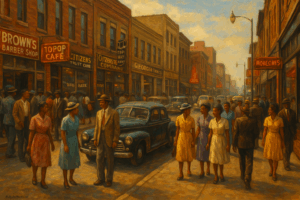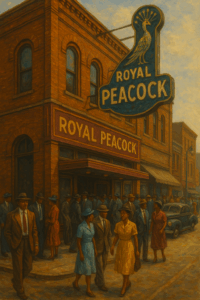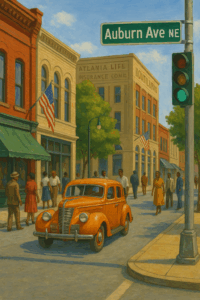
Soul of a Street: Sweet Auburn and the Zest of Black Atlanta
Extended Readings from the Igotchu x Urban Intellectuals Seasonings Collaboration — a tribute to community, culture, and Atlanta-born taste.
Explore Fannie Lou Hamer | Georgia Gimore | Sweet Auburn | George Washington Carver

Igotchu Seasonings X Urban Intellectuals Collaboration, 4 Flavor Seasonings + History Pack!
Introduction
 In the early 20th century, Atlanta’s Sweet Auburn Avenue was more than a street — it was a heartbeat. Once called “the richest Negro street in the world,” Auburn Avenue was lined with banks, insurance companies, barber shops, restaurants, churches, and cultural institutions that thrived despite the segregation of Jim Crow.
In the early 20th century, Atlanta’s Sweet Auburn Avenue was more than a street — it was a heartbeat. Once called “the richest Negro street in the world,” Auburn Avenue was lined with banks, insurance companies, barber shops, restaurants, churches, and cultural institutions that thrived despite the segregation of Jim Crow.
It was a place where Black entrepreneurs built wealth, where activists gathered, where music poured from jazz clubs, and where faith carried people through struggle. It was a place of resilience and prosperity in the face of systemic exclusion.
This Lemon Garlic Pepper Seasoning honors Sweet Auburn’s energy. Just as lemon adds brightness, garlic adds depth, and pepper brings heat, Sweet Auburn was a blend of creativity, business, spirituality, and community pride. With every sprinkle, we remember the street that showed the world what Black excellence looked like when a community invested in itself.
It was a place where Black entrepreneurs built wealth, where activists gathered, where music poured from jazz clubs, and where faith carried people through struggle. It was a place of resilience and prosperity in the face of systemic exclusion.
The Legacy
Origins of Sweet Auburn
After the Civil War and Reconstruction, Atlanta became a major Southern city, but segregation pushed Black residents into specific neighborhoods. Auburn Avenue, stretching through the east side of downtown, became a center of Black life by the late 1800s.
The 1906 Atlanta Race Massacre, where white mobs attacked Black neighborhoods, only reinforced the segregation. Yet from that tragedy, Sweet Auburn rose as a symbol of self-determination. If Black people were barred from white-owned businesses, they built their own. If banks denied loans, Black bankers created institutions to serve the community.
Economic Power
Sweet Auburn became a powerhouse of Black-owned business. The most famous was the Atlanta Life Insurance Company, founded by Alonzo Herndon, a formerly enslaved man who became Atlanta’s first Black millionaire. His company offered insurance to Black families excluded from white firms, giving them security and dignity.
Other businesses soon lined the avenue: Citizens Trust Bank, the Atlanta Daily World (the first successful Black daily newspaper in the U.S.), barbershops, beauty salons, and countless small shops. At its peak, Sweet Auburn boasted hundreds of Black-owned businesses, circulating wealth within the community and inspiring generations.
Spiritual & Political Hub
Beyond business, Sweet Auburn was a spiritual and political center. Ebenezer Baptist Church, led by Martin Luther King Sr. and later Dr. Martin Luther King Jr., became a hub for worship and activism. From its pulpit came the words that helped galvanize the civil rights movement.
Nearby stood Big Bethel AME Church, Wheat Street Baptist Church, and other congregations that nurtured faith and organized action. Sweet Auburn hosted parades, rallies, and marches — proving that the street itself was both marketplace and movement.
Cultural Vibrancy

Sweet Auburn was also alive with culture. Jazz and blues clubs thrived alongside restaurants serving fried fish, cornbread, collard greens, and lemon-pepper chicken long before the flavor became an Atlanta signature. Festivals and gatherings turned Auburn into a place of both business and joy.
The avenue wasn’t just a social hub—it was a proving ground for innovation and leadership. Black-owned newspapers, banks, and insurance companies headquartered there gave the community both a voice and a foundation of stability. Citizens Trust Bank and the Atlanta Life Insurance Company stood as towering examples of what could be achieved in the face of segregation, offering financial services that white-owned institutions denied to Black Atlantans. Auburn Avenue became a living model of self-reliance and empowerment.
But the mid-20th century brought seismic change. Urban renewal projects, freeway construction, and white flight disrupted Auburn Avenue. The I-75/85 highway cut directly through the neighborhood, devastating businesses and scattering families. Many of the thriving institutions closed their doors, and the avenue that once symbolized Black prosperity began to decline.
Yet its legacy as a place of Black excellence remains deeply etched in Atlanta’s history. Today, Sweet Auburn is a historic district, home to the Martin Luther King Jr. National Historical Park, the King Center, and cultural preservation efforts. Community leaders and preservationists work tirelessly to protect its buildings and revive its spirit, ensuring that new generations can walk the same streets where history was made—and remember that Sweet Auburn was once the heartbeat of Black Atlanta.
The Food Connection
Food on Auburn Avenue
Food was central to Sweet Auburn’s story. Restaurants and cafés lined the avenue, offering more than meals — they offered gathering spaces where deals were struck, music was shared, and culture was celebrated.
Soul food dishes like fried chicken, catfish, greens, cornbread, and pies anchored the menus. But one flavor that stood out and eventually came to define Atlanta was lemon pepper. While the modern craze of lemon-pepper wings took off in the late 20th century, the roots of lemon, garlic, and pepper seasoning go back further, tied to the zest and spice of Southern cooking.
A plate of fried fish seasoned with lemon and pepper was a staple of Auburn eateries. Garlic, abundant in Southern kitchens, deepened the flavor. Together, the mix of lemon, garlic, and pepper reflected Auburn’s own personality: sharp, bold, unforgettable.
Food as Community
In Auburn, food wasn’t just for eating — it was for building. Restaurants became informal meeting rooms, where business leaders plotted strategies and churchgoers shared Sunday meals. During the civil rights era, activists gathered in cafés to plan marches and campaigns. A plate of food became fuel for freedom.
This seasoning blend honors that connection. Lemon for the brightness of creativity. Garlic for the depth of history. Pepper for the spice of resistance. Together, they carry the taste of Sweet Auburn’s soul.
Why It Matters Today
 Sweet Auburn’s legacy is not only about the past but about what is possible when communities invest in themselves. In an era when segregation was law, Auburn showed that Black entrepreneurship, culture, and faith could build a thriving economy and vibrant culture.
Sweet Auburn’s legacy is not only about the past but about what is possible when communities invest in themselves. In an era when segregation was law, Auburn showed that Black entrepreneurship, culture, and faith could build a thriving economy and vibrant culture.
Today, Black neighborhoods face new challenges — gentrification, displacement, and inequitable access to capital. The lessons of Sweet Auburn remind us that ownership, community solidarity, and cultural pride are keys to resilience.
Food, too, continues to be central. Atlanta’s lemon-pepper wings have become a cultural phenomenon, celebrated in music, media, and restaurants across the city. They are more than a flavor — they are a cultural marker, a symbol of Atlanta’s global influence. Tracing that back to Auburn Avenue roots reminds us how Black creativity turns local flavor into worldwide culture.
Preserving Sweet Auburn’s story matters because it shows that Black history is not just struggle — it is also triumph. It is businesses built from nothing, churches that nurtured movements, and kitchens that seasoned food with joy and purpose.
To season your food with lemon garlic pepper today is to honor the zest of a community that thrived against the odds — and to remember that its lessons are needed as much now as ever.
Reflection & Table Talk
-
How does your community support Black-owned businesses today?
-
What flavors or restaurants remind you of cultural pride and prosperity?
-
How can we preserve spaces like Sweet Auburn for future generations?
-
What does it mean for food to carry the “soul” of a place?
Call to Action
This seasoning is more than flavor — it’s an invitation to reclaim your story.
That’s why Igotchu Seasonings and Urban Intellectuals joined forces: to remind us that every kitchen can be a classroom, every bite a lesson in resilience.
- 🌱 Collect the full set of seasonings — each tied to a Black history legend, from Georgia Gilmore to Fannie Lou Hamer. Click here to purchase and learn more.
- 📚 Dive deeper with our Black History Flashcards — 52 powerful cards filled with stories like Carver’s, made for families to learn together. Click here to grab a deck.
- 🌍 Start your children early with the Sankofa Club — live and on-demand classes where kids discover Black history, leadership, and pride. Click here to join the club.
Your purchase keeps culture alive — on the table, in the classroom, and across generations. Because food tells our story. Let’s make sure it never goes untold.

Igotchu Seasonings X Urban Intellectuals Collaboration, 4 Flavor Seasonings + History Pack!
Sources / Further Reading
-
Henderson, Alexa Benson. Atlanta Life Insurance Company: Guardian of Black Economic Dignity. University of Alabama Press, 1990.
-
Pomerantz, Gary M. Where Peachtree Meets Sweet Auburn. Scribner, 1996.
-
National Park Service. “Sweet Auburn Historic District.” nps.gov.
-
King Center Archives. “Ebenezer Baptist Church and Auburn Avenue.”
-
Suggs, Henry L. The Black Press in the South, 1865–1979. Greenwood Press, 1983.





